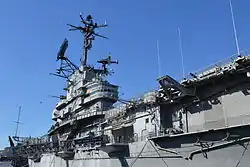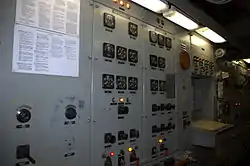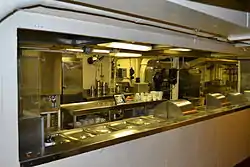USS Hornet Museum
USS Hornet (CV-12) (Aircraft Carrier) | |
.JPG.webp) USS Hornet docked in Alameda | |
| NRHP reference No. | 91002065 |
|---|---|
| CHL No. | 1029[1] |
| Significant dates | |
| Added to NRHP | December 4, 1991[2] |
| Designated NHL | December 4, 1991[3] |

The USS Hornet Museum is a museum ship, located on the southernmost pier of the former Naval Air Station Alameda in Alameda, California, US.
The museum is composed of the aircraft carrier USS Hornet, exhibits from the NASA Apollo Moon exploration missions, and several retired aircraft from the Second World War and the transonic and early supersonic jet propulsion period. A number of compartments contain exhibits concerning contemporary carriers that are supported by related associations. The flight deck, hangar deck, and first deck below are open for self-guided tours. Docent-led tours are available into the ship's navigation and flight deck control areas of the island and down into one of the engineering spaces containing two of the four ship's propulsion turbines.
Aircraft Carrier Hornet Foundation preserves and honors the legacy of USS Hornet, a national historic landmark,[4] and its role in naval aviation, the defense of the United States, the Apollo Program, and exploration of space.
Opening ceremony
The USS Hornet Museum officially opened to the public on October 17, 1998. Apollo 11 astronaut Buzz Aldrin was the principal speaker. Attending dignitaries included Congresswoman Barbara Lee; Honorable Jerry Brown – Mayor-elect of Oakland; Honorable Ralph Appezzatto – Mayor of Alameda; General Richard Hearney – Vice President for Domestic Business Development, Boeing Company; and Rear Admiral Robert Chaplin – Superintendent, Naval Postgraduate School, Monterey, California.[5]
Aircraft on display
The USS Hornet Museum has a number of aircraft on display including propeller aircraft, jet aircraft, and rotorcraft. The aircraft are from the 1940s, 1950s, 1960s, 1970s, and 1980s. Museum guests can get up-close to the aircraft displayed on the flight deck and on the hangar deck. Aircraft are sometimes moved between decks utilizing the ship's #1 aircraft elevator. Exhibit highlights include:
- TBM-3E Avenger – torpedo bomber from World War II
- T-28B Trojan – military trainer
- US-2B Tracker – anti-submarine warfare (ASW) utility aircraft
- FJ-2 Fury – 1950s swept-wing fighter jet
- TA-4J Skyhawk – trainer from the last aggressor squadron, VC-8
- F8U-1 Crusader – Vietnam War era supersonic fighter
- S-3B Viking – all-weather, multi-mission, long-range aircraft
- F-14A Tomcat – veteran of the Gulf War
- F-4J Phantom II - Vietnam era multirole fighter
- HUP-1 Retriever - ship based utility helicopter for search and rescue
- SH-2 Seasprite - Mid-1950s shipboard utility helicopter
- SH-3H Sea King - All weather helicopter designed for anti-submarine warfare
- UH-34D Seahorse - Vietnam era personnel transport and combat assault helicopter
- FM-2 Wildcat - WW2 fighter
Apollo splashdown display
USS Hornet was selected in 1969 to serve as the Prime Recovery Ship (PRS) for the Apollo 11 Moon mission. Hornet led the recovery of the first astronauts to land on the Moon following their splashdown back on Earth. Four months later, Hornet recovered the all-Navy crew of Apollo 12. The USS Hornet Museum has the largest Apollo Program exhibit on the West Coast of the United States. Artifacts on display include:
- Apollo Command Module CSM-011 used for the AS-202 uncrewed suborbital flight test[6]
- Mobile Quarantine Facility (MQF) used by the Apollo 14 astronauts following their return to Earth
- SH-3H Sea King used in the 1995 movie Apollo 13
- Memorabilia and photos from the Apollo 11 and 12 splashdowns
CarrierCon
The Hornet Museum also hosts CarrierCon, a fan convention for anime, video game, comic and cosplay fans. In 2023, CarrierCon collaborated officially with Azur Lane, a popular Chinese mobile game with an English release that features anthropomorphic "shipgirls" including Hornet herself as Hornet II to distinguish her from the original Hornet.[7] Later that year, Hornet was chosen to host Azur Lane's live event celebrating the 5th anniversary of its English/worldwide release.[8]
Gallery
 The island
The island Flight deck and the island
Flight deck and the island Flight deck, with San Francisco in the background
Flight deck, with San Francisco in the background Hangar deck
Hangar deck Hangar deck
Hangar deck Apollo Command Module CM-011A for AS-202 mission
Apollo Command Module CM-011A for AS-202 mission A steam turbine in the engine room
A steam turbine in the engine room Control panel in the engine room
Control panel in the engine room_enlisted_berthing_2.JPG.webp) Enlisted berthing
Enlisted berthing_Marines_head_1.JPG.webp) Marines' head (term for bathroom)
Marines' head (term for bathroom) Passageway on the second deck
Passageway on the second deck_pharmacy.JPG.webp) Pharmacy
Pharmacy Mess deck
Mess deck
See also
- U.S. Navy museums (and other aircraft-carrier museums)
- List of aircraft carriers of the United States Navy
- List of maritime museums in the United States
- Pacific Reserve Fleet, Alameda
References
- "USS Hornet". Office of Historic Preservation, California State Parks. Retrieved March 30, 2012.
- "National Register Information System". National Register of Historic Places. National Park Service. January 23, 2007.
- "USS Hornet (Cvs-12) (Aircraft Carrier)". National Historic Landmark summary listing (where year designated appears as 1992, believe to be incorrect). National Park Service. September 28, 2007. Archived from the original on October 12, 2007.
- http://www.nps.gov/nhl/find/statelists/CA.pdf List of National Historic Landmarks located in California
- Opening Ceremony program
- "PERMANENT EXHIBITS". USS Hornet museum. Retrieved October 22, 2016.
the Apollo Command Module – CM-011. It was used for the uncrewed mission AS-202 on August 26, 1966
- CarrierCon (February 17, 2023). "CarrierCon 2023 Azur Lane Collaboration Announcement". Instagram. Retrieved August 2, 2023.
- CarrierCon [@CarrierConBA] (July 20, 2023). "Calling all Commanders and Ship Girls! We are proud to announce that we are hosting the Azur Lane 5th Anniversary celebration event! Come celebrate with our friends @AzurLane_EN @HornetChanVT!! August 13th, 2023 – 707 W Hornet Ave, Alameda, CA 94501 #AzurLane5thAnniv" (Tweet). Retweeted by Azur Lane. Retrieved August 2, 2023 – via Twitter.
External links
- Official page USS Hornet Museum and Aircraft Carrier Hornet Foundation